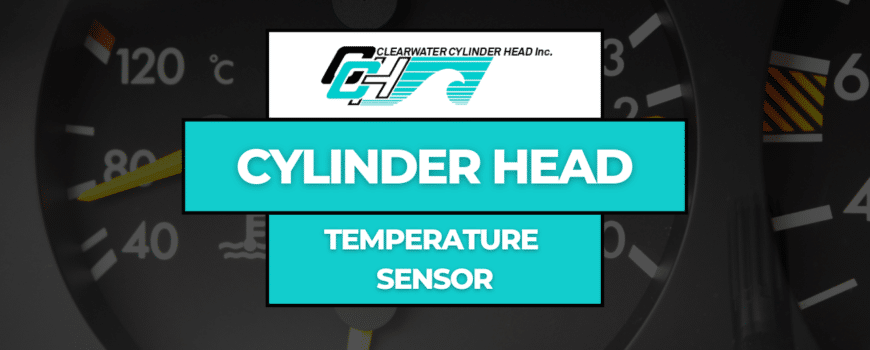Many newer cars have a lot of amazing technology integrated into their systems that allow for safer driving and easier maintenance. These unique systems allow the vehicle to adjust its inner workings to maximize output or protect parts without the owner’s assistance.
While these devices are incredibly useful, some maintenance can be required from time to time. If they struggle with efficiency or outright break, it is essential to get them repaired to save future headaches. One of the most important components in modern cars, the cylinder head temperature sensor, is one example. Here’s an overview of the science behind the sensor and how to know when it may be time for a replacement.
What Is a Cylinder Head Temperature Sensor?
Your vehicle’s engine takes temperature constantly into consideration, and bases much of its performance on that key factor. The engine control module (ECM) is the brains behind the engine and controls the temperatures in order to keep things running smoothly.
For example, when your engine is cold and you want to start it up, it may need more fuel than normal, or if your engine is running too hot, the ECM may call for less fuel or more coolant to maintain maximum efficiency and safety. What keeps the ECM aware of the engine’s temperature is the cylinder head temperature (CHT) sensor.
The CHT sensor connects right to the engine’s cylinder head and can sense temperatures as low as -40°F or as high as 500°F. One benefit of the CHT sensor is it takes its readings directly from the metal of the engine as opposed to other models such as the engine coolant temperature (ECT) sensor, which bases its reading on the temperature of the coolant it’s submerged in. These sensors are very handy and can save your engine from stalling or wasting fuel, and the CHT especially can give up-to-date and highly accurate readings.
Signs Your Cylinder Head Temperature Sensor Needs to be Replaced
Your cylinder head temperature sensor can become damaged over time and it’s important to know the signs so you can get it replaced as soon as possible. Monitoring cylinder head temperatures is essential for proper engine calculations, so if the CHT sensor is off it can lead to fuel inefficiency, overheating, stalling, or even complete engine failure.
If you notice the following, be sure to schedule an appointment with a trusted mechanic to get back on track.
- Extended cranking time when trying to start your vehicle
- Decrease in fuel economy
- Decrease in acceleration
- Check engine light comes on
- Your vehicle jumps when you accelerate
The causes of malfunction can vary greatly, but some symptoms can point to specific issues more than others. Being aware of these symptoms and their meanings can help save a great deal in repair costs.
For example, inaccurate or uneven temperature readings can be caused by interruptions between the CHT signal and the ECM. This usually means damage to the wires that connect the two or faulty contact with objects that are shorting the circuit. Other symptoms of damage to the signal include the air conditioner malfunctioning, the radiator fans coming on nonstop, or even the engine entering failsafe mode.
Other signs of a faulty CHT to ECM connection could be a lack of voltage coming off the CHT sensor once tested. Voltage usually decreases the hotter the engine gets, but it still fluctuates as it tries to find the ideal voltage at which to balance the current engine temperature. If there is no voltage, then that signals a break in the circuit, or even corrosion to the sensor itself.
Trouble codes or even a complete disconnection of the CHT sensor usually manifests as a temperature reading of -40°F consistently being shown, regardless of actual engine temperature.
Check Your Warranty
Being aware of the warranty for a CHT sensor can be a great way to save money. Different brands have a different warranty, but most follow the procedure of replacing defective or broken sensors for a limited time after purchase.
For example, Bosch LLC states that the warranty starts the day you receive their product but if it is defective, to contact the store you got it from for a new one. However, you will have to pay the labor fees associated with replacing it so it’s not always completely free, but remains much cheaper than a totally out-of-pocket replacement.
Where To Buy a Cylinder Head Temperature Sensor
Address: 1748 S Missouri Ave, Clearwater, FL 33756
Phone: (727) 286-5234
Address: 22991 US Hwy 19 N, Clearwater, FL 33765
Phone: (727) 797-9027
Address: 1490 N Belcher Rd., Clearwater, FL 33765
Phone: (727) 447-2593
Buy Replacement Heads with Clearwater Cylinder Heads
Clearwater Cylinder Heads knows exactly why cylinder heads are important and have spent years perfecting the care and replacement of clients’ cylinder heads. If you notice anything wrong with your cylinder head or need a replacement, Clearwater Cylinder Head is happy to help with their incredible expertise and cylinder head selection. With over 25 years of experience and a massive catalog of products, Clearwater Cylinder Heads is dedicated to providing professional support in all of your cylinder head needs. Feel free to contact Clearwater Cylinder Head Inc. toll-free at 1-800-572-1963.

